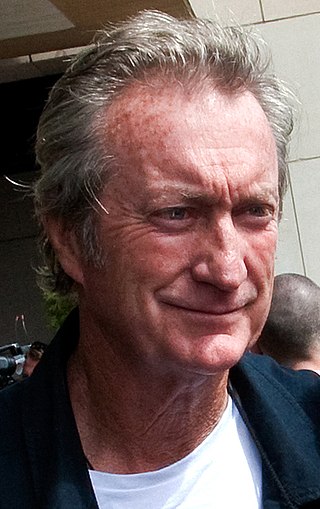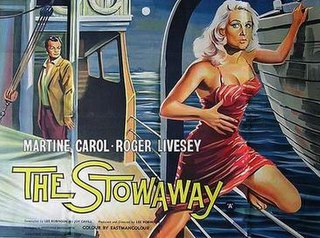Related Research Articles

Jack Thompson, AM is an Australian actor and a major figure of Australian cinema, particularly Australian New Wave. He is best known as a lead actor in several acclaimed Australian films, including such classics as The Club (1980), Sunday Too Far Away (1975), The Man from Snowy River (1982) and Petersen (1974). He won Cannes and AFI acting awards for the latter film.

Bryan Neathway Brown AM is an Australian actor and author. He has performed in over eighty film and television projects since the late 1970s, both in his native Australia and abroad. Notable films include Breaker Morant (1980), Give My Regards to Broad Street (1984), F/X (1986), Tai-Pan (1986), Cocktail (1988), Gorillas in the Mist (1988), F/X2 (1991), Along Came Polly (2004), Australia (2008), Kill Me Three Times (2014) and Gods of Egypt (2016). He was nominated for a Golden Globe Award and an Emmy Award for his performance in the television miniseries The Thorn Birds (1983).

Claudia Karvan is an Australian actress and producer. As a child actor, she first appeared in the film Molly (1983) and followed with an adolescent role in High Tide (1987). She portrayed a teacher in The Heartbreak Kid (1993) – the film was spun off into a TV series, Heartbreak High (1994–1999), with her character taken over by Sarah Lambert. Karvan's roles in television series include The Secret Life of Us (2001–2005), Love My Way (2004–2007), Newton's Law (2017) and Halifax: Retribution (2020). She won Best Actress in a Leading Role in a Television Drama at the AFI Awards for her appearance in G.P. (1996). She won two similar AFI Awards for her role in Love My Way and in 2014 for her work in The Time of Our Lives (2013–2014). As a co-producer and co-writer on Love My Way, she won three further AFI Awards for Best Drama Series in 2005, 2006 and 2007. Karvan was inducted into the Australian Film Walk of Fame in 2007 in acknowledgment of her contributions to the Australian film and television industry. From 2010 to 2011, she starred in the drama series Spirited, which she co-created and was executive producer. She appeared as Judy Vickers in Puberty Blues. Karvan has co-produced House of Hancock and Doctor Doctor (2016–2021). In 2021 she co-created, co-produced and starred in the TV drama series, Bump.
Joan Sydney King was an English-born Australian actress, primarily known for her television roles in soap operas and serials but who also appeared in theatre.
Siren is a 1990 play by Australian playwright David Williamson.
The Top Ten Money Making Stars Poll were polls on determining the bankability of movie stars. They began quite early in the movie history. At first, they were popular polls and contests conducted in film magazines, where the readers would vote for their favorite stars, like the poll published in New York Morning Telegraph on 17 December 1911. Magazines appeared and disappeared often and among the most consistent in those early days were the polls in the Motion Picture Magazine.

The Stowaway is a 1958 French-Australian film directed by Australian director Lee Robinson and French Lebanese director Ralph Habib. It was shot on location in Tahiti and is one of the few Australian financed movies of the 1950s, although the storyline has nothing to do with Australia.
Hungry Heart is a 1987 Australian film about a love affair that goes wrong.
The Surfer is a 1986 Australian film directed by Frank Shields and starring Gary Day and Gosia Dobrowolska. It was filmed in South-East Queensland.
Martin Allan Lass is an American violinist and sometime astrologer, who grew up, and started his performance career, in Australia.
Prejudice, working title Harassed, is a 1989 television film about two women who go to the Anti-Discrimination Board. It was one of a series of TV movies about social issues made by Film Australia with the Nine Network. This docu-drama looks at sexual harassment and racial discrimination. The lead actresses improvised based on scene outlines based on real accounts and acted along with real staff from the Anti-Discrimination Board.
Drums of Mer is a 1933 Australian novel by Ion Idriess set in the Torres Strait in present-day Queensland, Australia.
Silent Number is an Australian TV series about a police doctor played by Grigor Taylor. It was created by Ron McLean. It aired from 1974 to 1975.
Graham Tardif is an Australian screen music composer. He is the composer on ten feature films directed and written by Rolf de Heer. Their most acclaimed collaboration, The Tracker (2002), resulted in an APRA-AGSC Screen Music Award for "Far Away Home" as Best Original Song Composed for a Feature Film, Telemovie, TV Series or Mini-Series in 2002. The Tracker also provided wins at Film Critics Circle of Australia Awards and IF Awards for the pair.
Gwen Kelly was an award-winning Australian novelist, short story writer and poet, whose fourth novel, Always Afternoon, was made into a television mini-series in 1988. She was considered by some to be one of the "major Australian writers", whose novels are "an intimate chronicling of women's lives and of our yesterdays", "probing stereotypical Australian attitudes and behaviour".
Mall Molesworth and Emily Hood Westacott claimed their second domestic title by defeating Joan Hartigan and Midge Van Ryn 6–3, 6–3 in the final, to win the women's doubles tennis title at the 1933 Australian Championships.
The Australian PGA Seniors Championship is a golf tournament in Australia.
The 1988 Australian Film Institute Awards were awards held by the Australian Film Institute to celebrate the best of Australian films and television of 1988. Twenty six films were entered for the feature film categories.
The 1987 Australian Film Institute Awards were awards held by the Australian Film Institute to celebrate the best of Australian films and television of 1987. The awards ceremony was held at the Palais Theatre in Melbourne on 9 October 1987.
Raymond Richard Harding is a New Zealand film and television scriptwriter, producer and story editor. He started his television writing career working for Crawford Productions in 1979. Harding has worked on three of Australia's most well-known soap operas; Home and Away, Neighbours and A Country Practice. He wrote the telemovies I Can't Get Started and Sisterly Love, and scripted episodes for various dramas and children's programmes, including Mirror, Mirror, The Adventures of Skippy, The Miraculous Mellops, and Blue Heelers. He also acted as a story consultant on MDA. Harding has taught at the University of London and Charles Sturt University. He is also a playwright. In 2019, Harding was appointed a Member of the Order of Australia (AM).
References
- ↑ "WEDNESDAY DECEMBER 27". The Canberra Times . Vol. 64, no. 19, 980. Australian Capital Territory, Australia. 24 December 1989. p. 5 (THE GUIDE). Retrieved 26 September 2020– via National Library of Australia.
- ↑ Ed. Scott Murray, Australia on the Small Screen 1970-1995, Oxford Uni Press, 1996 p142
- ↑ "Tina Kaufman at "The Motion Picture Today" seminar". Filmnews . Vol. 18, no. 8. New South Wales, Australia. 1 September 1988. p. 3. Retrieved 26 September 2020– via National Library of Australia.
- ↑ "AFI TV nominations". Filmnews . Vol. 18, no. 8. New South Wales, Australia. 1 September 1988. p. 3. Retrieved 26 September 2020– via National Library of Australia.
- ↑ Dennis, Anthony (16 September 1987). "Producer set to can film over union ban". Sydney Morning Herald. p. 2.
- ↑ "ABC's Sisterly Love - a comedy of relationships". Torres News . Queensland, Australia. 22 December 1989. p. 34. Retrieved 26 September 2020– via National Library of Australia.
- ↑ Kent, Simon (26 December 1989). "Sisterly Love". Sydney Morning Herald. p. 50.
- ↑ Hooks, Barbara (27 December 1989). "A sisterly alchemy of golden wisdom and humour". The Age. p. 14.